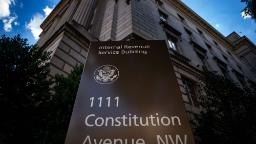CNN
—
In its latest effort to show that it is putting its extra congressional funding to good use, the Internal Revenue Service said Friday that it is shifting its enforcement efforts to high-income earners, partnerships and big corporations.
The agency will also ensure that audit rates do not increase for those earning less than $400,000 a year – echoing President Joe Biden’s pledge not to raise taxes on those below that threshold – and will add more safeguards for lower- and moderate-income taxpayers who claim the earned income tax credit.
“This new compliance push makes good on the promise of the Inflation Reduction Act to ensure the IRS holds our wealthiest filers accountable to pay the full amount of what they owe,” said IRS Commissioner Danny Werfel, noting that years of underfunding led to the lowest audit rate of well-off filers in the agency’s history.
The additional IRS funding contained in the Inflation Reduction Act has been a political football since Democrats pushed the legislation through Congress last year. The law provided the cash-strapped agency with roughly $80 billion over 10 years to ramp up enforcement and improve customer service.
It quickly hired thousands of new representatives to help with the 2023 tax filing season, allowing the agency to answer more calls, cut phone wait times, serve more taxpayers in person and clear the backlog of unprocessed 2022 individual tax returns that had no errors. It is also modernizing its decades-old technology.
But congressional Republicans, as well as 2024 GOP presidential primary candidates, argue that the invigorated IRS will use its enforcement power against hard-working Americans. They repeatedly say that the IRS plans to use the money to hire 87,000 agents to pursue middle-class taxpayers.
House GOP lawmakers succeeded this spring in rescinding more than $20 billion of the Inflation Reduction Act funding as part of the deal to raise the debt ceiling. And it hopes to cut more as part of the fiscal 2024 federal spending package that’s now under discussion in Congress.
The agency said it plans to use improved technology and artificial intelligence to help it better detect tax cheating, identify emerging compliance threats and improve the selection of cases to audit. It will also go after promoters who abuse tax laws.
“We will increase our compliance efforts on those posing the greatest risk to our nation’s tax system, whether it’s the wealthy looking to dodge paying their fair share or promoters aggressively peddling abusive schemes,” Werfel said.
It will expand its focus on taxpayers earning more than $1 million who have more than $250,000 in recognized tax debt. The agency, which recently collected $38 million from more than 175 high-income earners, is contacting about 1,600 taxpayers who fall into this category and owe hundreds of millions of dollars.
By the end of September, the IRS will start examining 75 of the largest partnerships, including hedge funds, real estate investment partnerships, large law firms and others. It will harness artificial intelligence to identify potential compliance failures in partnership tax, international tax and general income tax and accounting. And early next month, it will reach out to about 500 partnerships that have discrepancies in their balance sheets.
In the coming fiscal year, which starts in October, the agency plans to expand its efforts involving digital currency compliance, taxpayers with foreign bank accounts who don’t file the required forms and construction contractors who set up shell subcontracting companies.

